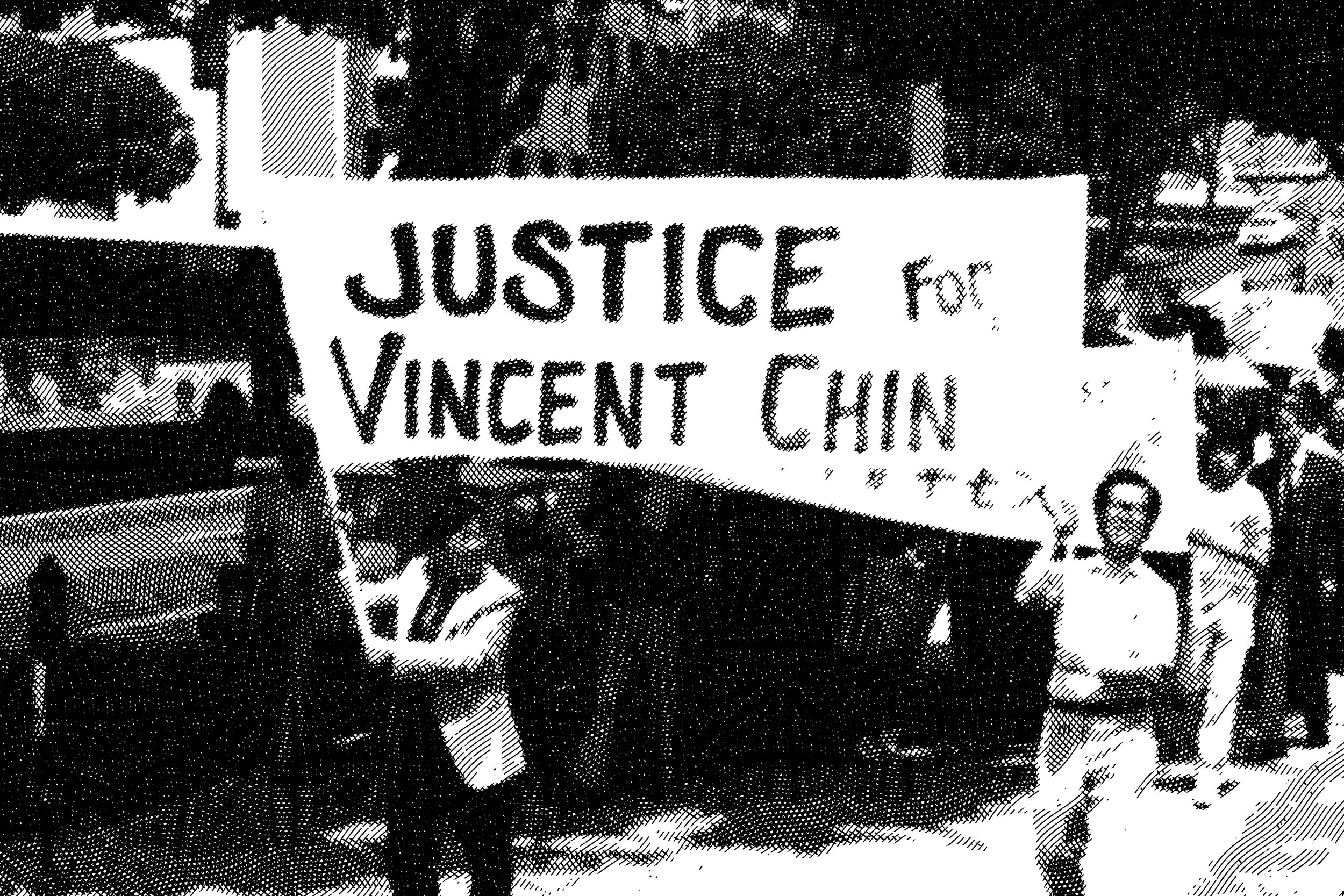
Frequently Asked Questions
FREQUENTLY ASKED QUESTIONSWhat was the significance of the campaign for justice for Vincent Chin?
After the shocking sentence of probation for a violent murder, the disparate Asian American communities of Detroit came together for the first time to seek equal justice from the legal system. This pan-Asian effort brought together different Asian ethnicities together across culture, language, immigration experience, class backgrounds from restaurant workers to PhD engineers--all to stand against racism and to fight for equality. A new organization, American Citizens for Justice (ACJ) was formed to advocate for Vincent Chin's family and the Asian American community -- and beyond the immediate goals, to unite with other communities in the cause for equality and justice. The newly formed effort garnered the support of many Black community leaders and organizations in Detroit and beyond, as well as Jewish, Arab-American, Latinx, Faith leaders, and many other individuals and groups that stand for social justice.
ACJ and the united justice-seeking communities in Detroit mounted a massive public education and outreach effort, with protests in cities across the country; numerous press conferences and updates on the legal efforts to fight for justice; letter-writing campaigns to local, state and federal officials, including the US Department of Justice. These legal efforts included filings with and appearances before the sentencing judge and the prosecutor's offices; appeals filed with the Michigan appellate courts; meetings with Members of Congress, US Attorneys and the US DOJ Civil Rights division, and many community leaders.
These efforts helped bring public attention to the anti-Asian hate that led to Vincent Chin's murder, as well as encouraging Asian American groups across the country to advocate for equality and justice. The efforts to get Judge Kaufman to vacate his sentence of probation failed as he sought to justify his reasoning. In addition, the US DOJ brought federal civil rights charges against the killers, who were ultimately acquitted on appeal, on grounds of pre-trial publicity and errors made with witnesses.
Although the criminal proceedings did not change the sentence for the killers, who ultimately never spent a day in jail for taking Vincent Chin's life, the campaign for justice led to many changes that benefited people of all communities. The county prosecutors office changed its policies to ensure that crime victims would be represented by prosecutors at sentencing. Later, the state of Michigan amended its procedures to allow victim impact statements at sentencing; in Michigan, this was informally known as the "Vincent Chin Rule." The Vincent Chin campaign contributed to the process used by Olympic gymnasts who had been abused by their team doctor, allowing 204 women to speak up in court with at his sentencing. In addition, the Vincent Chin helped bring attention to hate crimes legislation to many states and, ultimately, into federal law in 2009.
For Asian Americans -- it marked how diverse communities came together as a national voice calling for equality, justice and an end to racial discrimination. Prior to the campaign for justice for Vincent Chin, communities of Asian descent in the U.S. were largely separate from each other with no collective Asian voice to advocate together for equal justice. Because of ACJ and the Vincent Chin campaign, Detroit was the epicenter for a new civil rights movement led by Asian Americans, reaching out nationally in solidarity with other communities of color and conscience. Since 1983, numerous pan-Asian legal advocacy organizations, many grassroots community groups and newer generations of young AAPI activists have emerged as a direct result of the campaign for justice for Vincent Chin.
How does today's anti-Asian climate compare to when Vincent Chin was killed?
In the late 1970s, oil tensions in the Middle East led to gas shortages and sky-rocketing fuel prices across America, which contributed to a decade-long economic recession in the country. In the Midwest, there was a deep depression resulting from the collapse of the auto industry, which brought down the entire manufacturing sector of the U.S. Millions of workers became unemployed indefinitely at the same time that unions and the safety net of public assistance benefits were under attack in Washington. Hardship and misery abounded, while auto company CEOs and union leaders alike deflected blame by pointing at Japan for the auto industry's collapse: they claimed that Japanese fuel-efficient cars had destroyed the auto industry, but ignored the fuel-efficient German cars with no similar outrage targeting Americans of German descent; racism only works when the target looks "different."
Hate-filled innuendo, declaring "war" on Japan, with highly publicized threats to send nuclear bombs, Congressional leaders calling Asians "little yellow people"-- such daily pronouncements led to a climate of intense anti-Japanese and anti-Asian hate. In a toxic atmosphere that scapegoated Japan for America's domestic economic problems, anyone who looked Japanese, like Chinese American Vincent Chin, became a moving target.
Today, 40 years after Vincent Chin was killed, Asian Americans are not only facing the public health crisis caused by the global Covid-19 pandemic, but the tsunami of anti-Asian hate has led to more than 10,000 hate incidents self-reported to a single website, StopAAPIhate.org. Mass shootings of Asian Americans have taken place in Atlanta and Indianapolis; Asian elders have been fatally attacked; Asian women and girls are targeted two-to-one; and it seems that every day brings more horrific news of Asian Americans being violently assaulted -- simply because they look Asian. Hateful innuendo from prominent people, including the former president, has been clearly linked to spikes in anti-Asian attacks. Meanwhile, viral videos and news media replays give the impression that most anti-Asian attacks are by Black people, when two separate academic studies show that the majority of anti-Asian incidents are committed by adult white males.
The legacy of Vincent Chin and the campaign for justice offers lessons to all on how people of all races, including between Asian and Black Americans, and from all creeds and walks of life, can organize and come together to stand against intolerance of all kinds to build the beloved community that is safe and welcoming to all. That is the message and the goal of the Vincent Chin 40th Remembrance and Rededication, June 16-19, 2022.
What is the Vincent Chin 40th Remembrance and Rededication COVID policy?
The health and safety of everyone who attends the Vincent Chin 40th Remembrance and Rededication is our number one priority.
All VC40 attendees are required to show photo ID and provide proof of a full COVID-19 vaccination. We strongly recommend that everyone eligible get a booster shot prior to attending any Vincent Chin 40th Remembrance and Rededication events.
All attendees should anticipate being required to wear masks at all indoor venues, per CDC guidelines, except when actively eating or drinking. Entry requirements and venue protocols are subject to change.
We are committed to implementing all protocols necessary to make the Vincent Chin 40th Remembrance and Rededication a safe experience for all.


